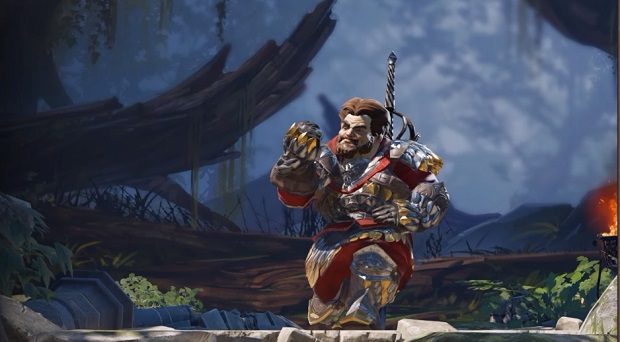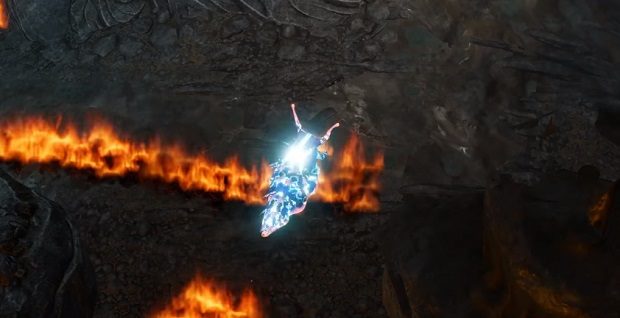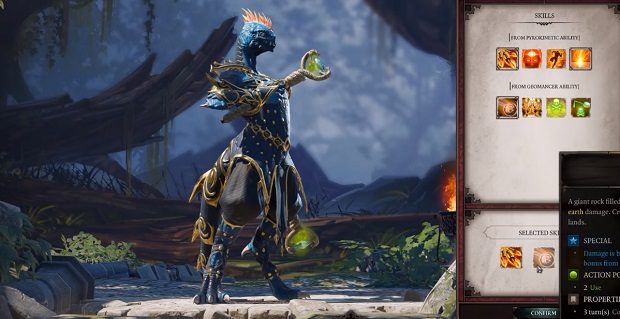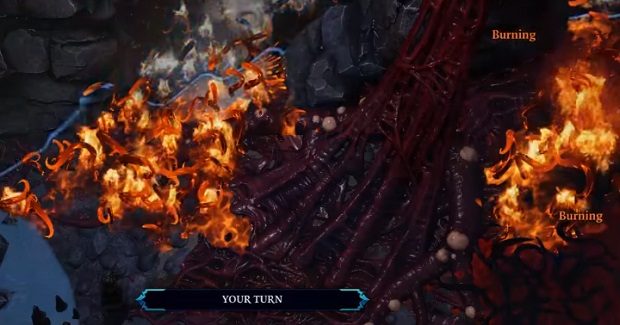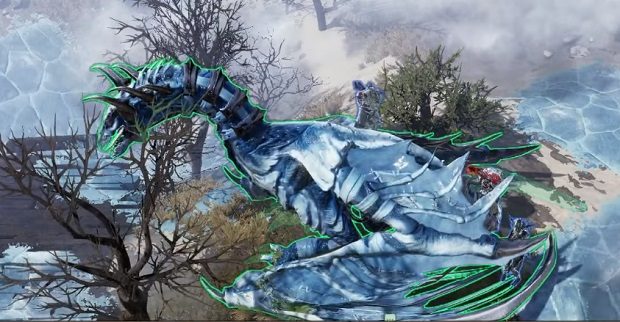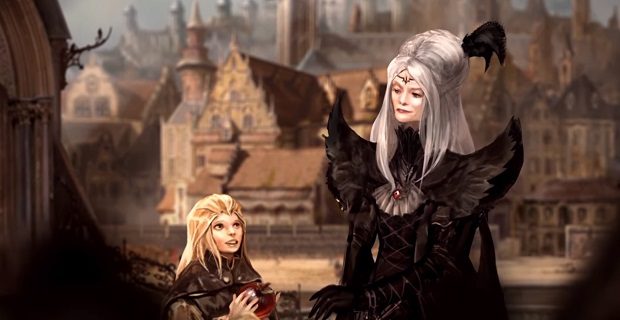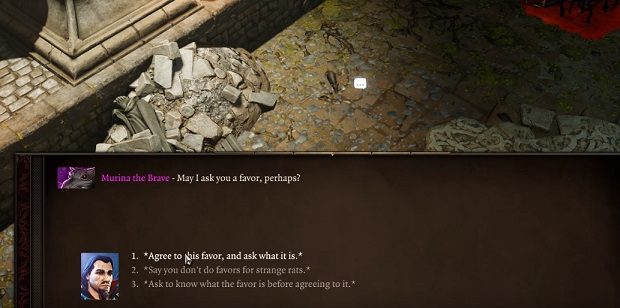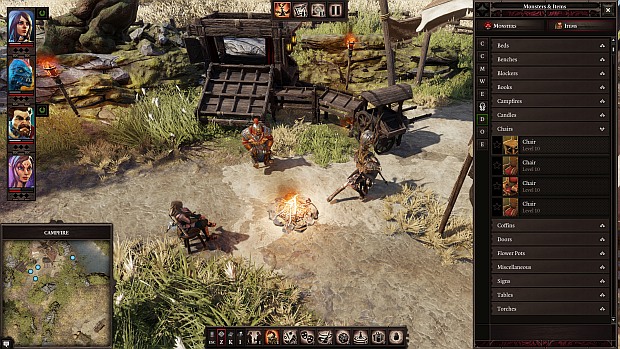Wot I Think: Divinity Original Sin 2
Divinest Divinity
We were supposed to be heroes. As you play through Divinity: Original Sin 2 [official site], your character and companions will be many things to many people: thieves, killers, saviours, fugitives, outcasts, demons, nightmares, lovers, traitors, jackasses, adventurers, pranksters and fools. But heroes? You can play through the entire game, multiple times, and never feel like much of a hero.
There's just so much to do in the world that doing good can feel just a little to obvious.
If you're not familiar with its predecessor, a glance at Original Sin 2 might make you think it's a sibling to those other Kickstarted RPGs - Pillars of Eternity, Torment and the rest - that want to recapture the magic of the nineties. Sure enough, it's isometric, party-based, and contains elves and dwarves aplenty. Spend even a little time with it and you'll find something far weirder and more inventive than just about anything you might have encountered that features both dungeons and dragons.
Here's just one example of how strange things can quickly become from an early part of the game. I am a skeleton, animated and alive in some sense, but a skeleton nonetheless. I've been having a rough time trying to socialise with the living, who are understandably frightened when they see me approaching. That's why I steal peoples' faces. It's also why I prefer spending time in dank caves rather than propping up the bar at the local tavern.
That's why I was delighted when I found one particular cave that stood out from all the rest. Trails of fire, like slow motion subterranean comets, lit the place and sent fans of flame flickering across the rock-face. Stunning, I chattered, my skull rattling out the words through some uncanny mechanism of speech that I'll never understand. And then I saw the comets for what they truly were: giant flaming slugs.
Ewww. I readied the water and salt and prepared to clean out the cave. And that's how it could have gone down, with the entire population of the cave reduced to raisin-like shriveled specks. Instead, I sat down and had a chat with one particular slug and half an hour later one of my companions is (I think) due to be wed to that slug.
You might not even meet that slug, let alone plan any nuptials with it, because Original Sin 2 has many stories that you can listen to or disrupt and rewrite as you go. So many, in fact, that it's easy to lose sight of the bigger picture. That's OK. There will be reminders and there will be recaps along the way. And the truth is that even though the big picture here is much more attractive than in Original Sin 1, where some of the details had been sketched in too hastily, it's still the little stories that really matter.
For now, let's forget that single, central story though, with all of its celestial ascensions and world-shaking choices. Instead, let's focus on the tales that happen in between the big moments. There are memories to pick from between the teeth of dying sharks, beasts of burden with dire prophesies to relate, cunning and depraved murders to solve, and oh so many wrongs to right (and rights to wrong).
With its face-stealing skellingtons and limb-munching elves, Divinity has more in common with an anthology of weird and witty macabre tales than a fantasy epic. There are legendary armour sets, bandits and hordes of loot for anyone craving that sort of thing, but I find the overall tone is more Discworld than D&D. That's a compliment to the world-building and strange internal logic of the mechanics as well as to the humour. It's not a comedy game, though, but rather a game that recognises the absurdity of life and death, and has found a setting that allows its writers to enjoy their cruel and kind streaks alike.
Right from the start there are so many stories that it can be overwhelming trying to keep track of exactly what is happening where, and who said what, and why that person deserves to be chopped into bits. With all the voices and distractions clamouring for your attention, it's important to tune into whatever is most interesting at any one moment rather than trying to take in everything at once. You might want to pick a pocket or two and that might land you in a cell or in a scrap with some guards, and from there you'll find new adventures. Or you might flirt with that unpredictable enchantress who joined your party and find yourself falling for her, then wonder just what to do when a couple of gods question your taste in romantic partners by suggesting she might kill you and your friends while you're sleeping. Maybe the solution is to turn her into a chicken, though that could certainly present new problems.
For every problem there are all manner of solutions and most of those solutions lead to a whole new set of problems. Though so much of my love for Divinity relates to the intricate interlocking systems that underpin everything, the true genius of Larian's stonking great game is in recognising that the players are the agents of chaos in an otherwise orderly world. The sheer amount of movable and interactive objects can make the whole of Original Sin 2 feel like a perpetual motion machine that'll keep on ticking long after you close the window. In reality, it's more like a big toybox full of fantastical, weird, wonderful and grotesque possibilities. It might not feel like it, but most of the time you can choose which toys to play with at any given moment.
Divinity might convince you that its NPCs are continuing with their lives behind your back, but play at your own pace and you won't miss anything. Not in singleplayer at least. If you bring some friends along for the adventure, all bets are off and that's precisely as it should be.
Early in development, Original Sin 2 was described to me as a “competitive cooperative game” and that's certainly part of the appeal. Up to four people can play together and rather than healing and buffing one another as good party members should, they can go off on an adventure of their own, trying to solve quests and conundrums in ways that contradict the choices of their friends. You can kill an NPC that they're trying to work with, preferably behind their back so that they get very confused about what's happening, or you can plant contraband goods in their inventory and watch as they come a cropper when they try to go through customs.
My favourite trick is a simple one: you can dye a poisonous green potion red and pass it off as a health potion. If you're pranking an undead character you'd do that the other way around, of course, because poison heals them and healing magic hurts them.
That sort of switcheroo trickery plays into the elements 'n' fluids turn-based combat, which has been improved since the first game. It was good then and it's better now, although sometimes a little too challenging and complex even on the easiest difficulty setting. Fighting requires thinking due to the number of skills character can apply in any situation, and the ways in which battlefields change as gases, fires and corruption spill across them. There's usually a way to turn the tide in your favour, given that water will kill fires, toxins can be blessed, and splashing through spilled blood can save your life if you play your cards right.
The clever tactical combat and brilliant storytelling are in place whether you're playing solo or as part of a group. Multiplayer is superbly implemented, allowing people to drop in and out at will, but it's not necessary. Think of playing solo as managing an entire party rather than just playing the leader though – you can treat your companions as NPCs but I've had much more fun playing them all off against one another, stepping in to make them behave as I reckon they would in any given situation.
Where I fall out with the game slightly, the structure is usually to blame. It's divided into acts and they are very discrete portions of a bigger world. There's so much separation between them, in fact, that by the time one has ended and the next has begun I feel like I've closed one book and moved onto the next in the series. I take lots of baggage with me, and leave plenty of things behind, but there is actual closure and when an area is done, as a rule, it really is done.
Because of this, I was initially tempted to squeeze every last experience (and experience point) out of one act before moving to the next, but that's folly. Original Sin 2 is a role-playing game in the truest sense; it is at its most rewarding when you select or create a character and then get ready to put on a performance.
Any complaints about the overall structure don't apply to the individual acts though. The first, which takes place in and around a not particularly joyous place called Fort Joy, offers a perfect dilemma for the kind of branching questlines that are the scaffolding for the game's weighty ambitions: you are on a prison island and you must escape. It's a perfect dilemma because the ultimate objective – LEAVE THE ISLAND – is so simple that the increasingly complex chains of events that lead to it always seem manageable, even at their most preposterous.
You might take an aggressive approach that finds you lost underground and knee-deep in blood, hacking lumps off an aggressive meat golem, or you might seek out people who will involve you in their own escape plans if you do them a favour or two. Chances are, you'll dip your toes into several different possible escape routes without even realising you're tugging at threads that can make the whole area unravel. Within each act, Divinity rarely draws attention to the spiderweb of possibilities you're caught in, preferring to trust you have the patience and intelligence to pick your way through.
There is some tension between the generosity with which everything from character creation to the handling of NPC deaths (no plot armour here; you can kill 'em all without breaking the game) allows freedom of approach, and yet every player is moving toward a conclusion that is mostly set in place. You are, whether you want to be or not, a very special person and no matter how much the game allows you to wriggle on the hook, you can't escape your destiny.
And I should restate that on the whole the game gives you a lot of wriggle room. From the second act onwards you're given plenty of flexibility to respec and switch around character builds, so you can approach quests with a full set of options rather than locking yourself into a particular playstyle.
That said, because freedom and flexibility define the game so strongly I do find the occasional restrictions frustrating. Source points, which are at the heart of the story and power the most dramatic and devastating abilities in the game, sometimes seem too scarce, but then with the right skillset they're too readily available to feel special. And there are times that I've missed out on a branch in a side-story because it was obscured by some illogical logic rather than intelligently obscure.
It's no surprise that a construction as vast and complex as this would have some balance issues, and even though I found my interest in the story waning toward the end, I'm already planning to restart a game I've just spent sixty hours playing. Maybe next time I'll actually feel like a hero come the final curtain. Whatever the case, the destination doesn't really matter – it's about the journey, and all those little stories that happen along the way. From its origin stories to its brief emergent narratives, few games let you take part in better tales than this one.
Divinity: Original Sin 2 is available now for Windows via GOG and Steam for £29.99. Other platforms may follow.
This review doesn't mention the GM Mode, which let's you build your own pen and paper style campaigns to play with friends; we've written about GM Mode here.

